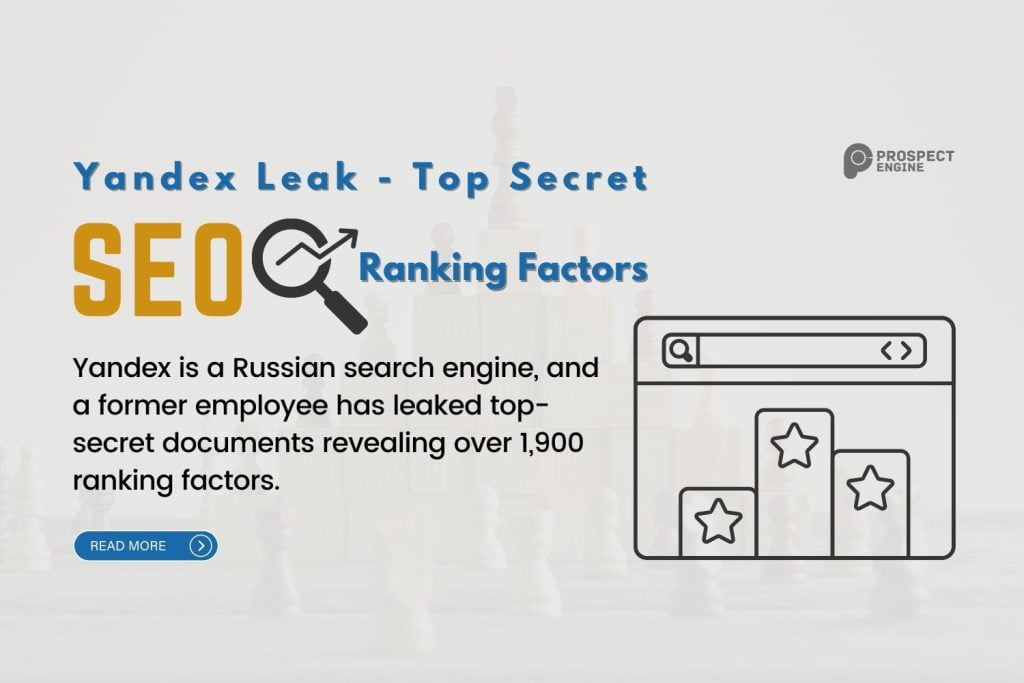In January 2021, news broke about a massive data breach at Yandex, Russia’s largest search engine. The breach affected over 4,800 Yandex email accounts, exposing personal information such as names, dates of birth, and phone numbers. Yandex confirmed that the breach occurred due to a technical vulnerability that has since been addressed. While Yandex stated that they did not believe any user data had been stolen, the incident served as a reminder of the importance of strong cybersecurity measures to protect against potential data breaches. The Yandex leak highlights the need for companies to prioritize cybersecurity and implement robust protocols to safeguard sensitive information.
How much easier would SEO be if you knew all the ranking factors of a search engine?
Today, we’ll look inside one of the world’s biggest search engines, not Google but the fourth largest, Yandex. Recently, a former employee leaked top-secret documents disclosing over 1,900 ranking factors, known as Yandex Leak. These factors have the potential to improve your SEO performance on Google, and you don’t need any technical knowledge to understand them.
I have produced a confidential report that translates and classifies all connected ranking elements. Let’s begin by contrasting Yandex with Google. We will carry out a fundamental information-based search for a keyword – search engine authorization – on both Yandex and Google. To make an equitable comparison, we will use the English language for Google and the Russian language for Yandex. It’s worth mentioning that this analysis may also reference the Yandex Leak, which could be relevant to the study.
It’s worth noting that these search engines have distinct operational methods, and their search behavior may differ. Therefore, the results should be taken cautiously, as the one-to-one rankings could differ substantially. However, it’s important to mention that this analysis may reference the Yandex Leak, which could potentially shed light on any discrepancies. Interestingly, Wikipedia appears as the top result for both search engines, and as we’ll explore the ranking factors, it receives an additional boost in Yandex.
It appears that both Yandex and Google utilize Wikipedia in their search rankings to a certain degree. However, it’s important to note that Wikipedia ranks higher on Yandex (number one) compared to Google (number three). This observation suggests that there may be some overlapping ranking factors, but they may not be identical. Furthermore, it’s worth mentioning that the Yandex Leak could potentially provide more insights into this matter.
It’s worth mentioning that conducting searches on Yandex often generates more Russian-centric results due to the “.ru” top-level domain. Consequently, the search outcomes on Yandex will differ from those on Google, which predominantly favors US-based results. Therefore, directly comparing the two search engines may not be entirely equitable. Additionally, it’s worth noting that the Yandex Leak could potentially shed more light on this aspect.
Upon analyzing the ranking factors on Yandex, it’s clear that websites with Russian domains or those with mostly Russian language content are deemed more important in the rankings. This isn’t surprising since Yandex gives priority to Russian content for its predominantly Russian-speaking user base. The Yandex leak incident serves as a reminder of the importance of adhering to such ranking factors and prioritizing cybersecurity to protect against potential data breaches.
Why would they show English-based results in a Russian search engine?
So the main point is that there are similarities, but if you want to rank well in Yandex, it’s best to build a Russian-based website on a Russian-based top-level domain. This will improve your website’s performance.
Now, let me take you to my computer to show you the Yandex index ranking factors. One of the key factors is backlinks, and we can see that Wikipedia is a strong booster. Getting a link from Wikipedia to your site can give you an additional boost in Yandex.
It’s important to note that we’re talking about Yandex, not Google, and that these factors are specific to Yandex. Along with Wikipedia, there are other good boosters, such as the percentage of words in links.
How much, like, is there an exact match anchor text being used in the link?
By utilizing anchor text that contains keyword-rich content, you can potentially reap benefits for search engines like Yandex Leak. However, it’s crucial to exercise caution, as excessive use of exact match anchor text can actually harm your search engine ranking. This same principle applies to Google, where exact-match anchor text can be effective but must be used with great care. Additionally, click behavior plays a significant role in search engine ranking. Different types of clicks are measured, including those in search results, on websites, and related to videos. To improve your Google ranking, it’s important to focus on encouraging users to click on search results, spend more time on your website, and engage with various elements such as videos.
Our objective is to ensure that visitors spend significant time engaging with our website. This level of engagement is typically measured by click behavior, which Yandex Leak and Google likely use to assess the quality of a website. While high bounce rates on certain pages are not necessarily a ranking factor, they may indicate issues with the content or user experience on that particular page. To improve the overall performance of our website, we should leverage data and analyze keyword intent to tailor results to specific locations. This personalized approach is utilized by both Yandex and Google, as search results vary depending on the user’s location. By comprehending and applying these critical ranking factors, we can optimize our website and enhance its visibility to our desired audience.
Our goal is to increase website engagement and keep visitors on the site for longer periods of time. This engagement is a significant signal for Yandex and Google to understand how users interact with the site, and one way they measure this is through click behavior. If you notice high bounce rates on certain pages, this can indicate issues with the content or user experience. Although the bounce rate itself may not be a direct ranking factor, it can be a useful signal to analyze and improve pages.
Taking into account keyword intent is a crucial factor to consider when optimizing for search engines such as Yandex Leak and Google. As search results can vary based on the location of the user, it’s essential to have a comprehensive understanding of the various nuances in different regions. Implementing a personalized approach to search results can lead to a more effective and relevant user experience, ultimately enhancing the website’s overall performance.
By using data to our advantage and considering these ranking factors, we can improve our website’s performance and visibility on search engines like Yandex and Google.
As we work towards optimizing our website, it’s crucial to factor in the influence of language and localization on our rankings, particularly on search engines like Yandex Leak. For instance, websites that cater to audiences in Russia may receive a ranking advantage in Russian search results. Therefore, it’s essential to keep localization in mind while optimizing for keyword intent. This approach aligns with the leaked information regarding Yandex Leak’s ranking factors, further emphasizing the importance of considering language and localization when optimizing search engines.
Several page-level factors contribute to search engine rankings, including URL optimization, dwell time, and user experience. Notably, driving traffic to a website is a ranking factor in Yandex Leak, highlighting the significance of optimizing for language and user experience. By considering these elements, we can enhance our website’s search engine rankings and attract more traffic to our site. This approach aligns with the leaked information regarding Yandex Leak’s ranking factors and underscores the importance of optimizing for various page-level factors to achieve better search engine rankings.
If you invest in search ads on Yandex, it’s possible that your organic search results could benefit. Ironically, some people have suspected the same to be true for Google for a while now. While it’s uncertain for Google, paying for search ads may be a ranking factor in Yandex.
One of the most important ranking factors in Yandex is URL structure. It’s also a crucial factor for Google. So, it’s vital to have a proper URL structure that contains keywords you want to rank for.
To enhance your Yandex and Google search rankings, including your primary keyword in your URL structure is crucial. This straightforward tactic can make a significant difference. Factors such as relevance, link building, satisfying search intent, and delivering a positive user experience contribute to higher rankings. While these concepts aren’t groundbreaking, they are essential ranking factors that are also present in Google.
Therefore, focus on providing a good user experience, including relevant content, and optimizing your website structure and content for the keywords you want to rank for. By doing so, you can improve your organic search ranking in Yandex and Google.
We aim to prioritize relevant keywords and optimize our web pages to align with user intent. We are committed to producing exceptional content that delivers an outstanding user experience and then acquiring high-quality backlinks to showcase our website’s reliability and authority. This strategy aligns with the leaked information regarding Yandex Leak’s ranking factors and emphasizes the importance of focusing on user intent and demonstrating website credibility through quality content and backlinks.
Like Yandex Leak, user experience is crucial in search engine optimization. Dwell time is a critical aspect of user experience, as it determines whether or not a user returns to the website. If a user searches for a specific keyword, lands on our website, and subsequently returns to our site again, this signals positive user engagement and can potentially lead to a better search engine ranking.
To achieve success, our top priorities include creating exceptional content, strengthening our brand, and positioning ourselves as an industry authority. Although there are several factors to consider, the most critical aspect is producing high-quality content that delivers an excellent user experience. By concentrating on providing the best possible content and user experience, we can naturally attract positive user signals, which can ultimately lead to better search engine rankings. This approach aligns with the leaked information regarding Yandex Leak’s ranking factors, further emphasizing the importance of creating outstanding content and user experiences.
It appears likely that both Yandex Leak and Google employ similar methods for search engine ranking. This insight aligns with the leaked information regarding Yandex’s ranking factors. However, it’s crucial to approach this information with caution, as Yandex and Google are separate entities with their own distinct evaluation criteria. Although there may be some overlapping ranking factors, it’s reasonable to assume that Google utilizes more complex mechanisms to assess rankings.





